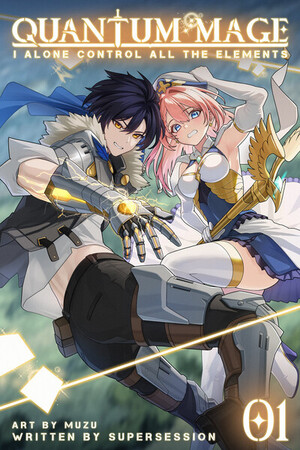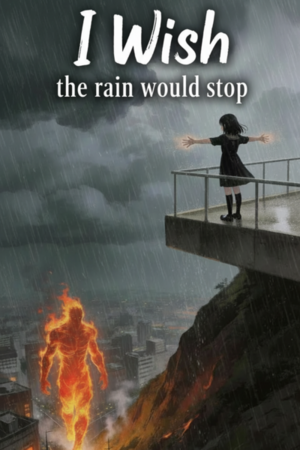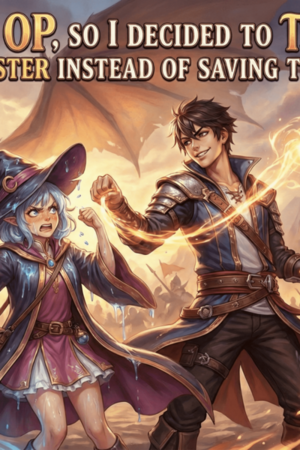Chapter 44:
Demon Exorcism Volunteers for Interplanar Law: III - The DEVIL of a Time
I Heard You Like Isekai, So I Put Isekai in Your Isekai
When dawn was cresting over the crust of the former far reaches of humanity, they pulled into the parking lot of a bar. It had a few cars in the lot, some still shiny and new, but most being bug shadows of their former selves, rusted and sagging, and sad.
The bar's sign broadcast to the adjacent desolation that it was called FIDDLES. Noodles stepped out onto the glistening pavement, her heels clicking, echoing across the expanse.
Everyday climbed out of her own seat and stretched. From within her pinstripe sportscoat, she pulled out a can of Dr Pepper. She cracked it open, toasted the sun, and downed it in one go.
Kenichi stepped out, squinted in the daylight and looked at the bar. It was run down, but the least run down thing for miles around them.
Scrivener stepped out of the driver's side, looked at Everyday and said, “How can you drink that first thing in the morning?”
Everyday crumpled the can and dropped it on the ground. She adjusted her pork pie hat and bolo tie, fiddling with the cuffs of her sleeves. “I just can,” she said.
Noodles popped open the trunk. The instruments lay scattered there. She placed her violin case back among the other things. She looked over at Kenichi. “Seltzer,” she said. “Your guitar.”
He walked over next to her and looked at the instruments. He briefly wondered which two were LaPlace’s and Pascal’s. He pulled out his guitar case. Then he looked at the violin case, remembering the comically large gun Noodles had pulled from it. He set the case on the hood of the golf and snapped open the clasps. The lid raised to show a velvet-lined interior, and nestled among the red fibers was his guitar: Drowsysword.
He looked over at Noodles. “You said you played, but I don’t think a gun is considered a musical instrument.” He picked up the guitar and started tuning it.
“Yeah,” she said. She glanced up at the guitar. It blinked at her.
Scrivener looked in the trunk. He picked up the tambourine. “Everyday,” he said. She kicked the crumpled can at her feet and joined him, grabbing the ukulele and giving the strings a few plucks.
Only the rabbit with antlers seemed at ease. It sat amidst a nest of broken chips and fur and whatnot in the middle of the back seat, flopped onto its side, breathing slowly, either asleep with its eyes open or completely uncaring about what was going on around it.
Kenichi finished tuning his guitar. He placed it back inside the case and closed it, snapping it shut against the morning air. Noodles looked from Kenichi to Scrivener to Everyday and they all nodded in turn when her eyes met theirs.
“Let’s go,” she said.
They walked across the parking lot, Kenichi carrying his case by his side, Scrivener and Everyday clutching their instruments like weapons, and Noodles, unarmed but imposing, leading the pack.
“Oh,” said Everyday. She dropped the ukulele, dropped to her knees, and with a gagging sound, began to vomit all over the concrete.
Scrivener looked down at her and Noodles looked back at her. “I guess we learned a little lesson,” the robot said.
Between gasps, Everyday said, “I wish I could die.” The Dr Pepper, the Twinkies, the chips, all met on the pavement. “Go on without me,” she said in a hoarse whisper. “I’ll be fine when--” but was interrupted by another wave of nausea.
Scrivener looked to Noodles. She nodded. “Just wait out here,” she said.
The remaining three pressed forward, stepping past the cars, old and new, and toward the door of the bar. Noodles pushed it open, holding it for Kenichi and Scrivener. Kenichi stepped inside, and his eyes needed to adjust to the darkness. Neon signs advertising beers illuminated the walls. There was a long bar with rows of liquor bottles lining the back wall. Black and white pictures showing different presumably famous people covered one wall like a collage. The center of the room was a wide open space with round tables and chairs, all easy to move and rearrange or remove completely to turn the open area into a dance floor. At the end of the room was a stage with a lone chair in the middle, and on that chair sat a man who looked like a scarecrow left to the elements for too long. Kenichi recognized him almost immediately from the picture he had seen in Acula’s office. He was plucking the strings on a fiddle, but a variety of instruments stood on stands behind him: banjo, trumpet, upright bass, and such. On the wall behind him were pieces of a guitar, arranged like an artwork, lined up to resemble the guitar it once was, but separated enough to know that it was broken. Noodles stopped and started at it.
The man with a face like a desert stone, looked up as they entered. “Welcome to Fiddles,” he said, his voice gravely and low, a sort of voice that’s regularly treated with whiskey and cigarettes before forcing it to sing.
“We’re here for a challenge,” Noodles said, her eyes not leaving the guitar on the back wall.
The man set down the fiddle. He stood from the chair. He stepped down off the stage. On the floor, he looked from one to another. “What are the wagers?” he asked.
“Name for Souls,” she said.
Fiddles laughed. He pointed at Scrivener. “That one doesn't have a soul,” he said. And he pointed to the door, where Everyday was contemplating her recent life decisions and trying to remember if she had eaten that recently. “And I don't want to anger that one's father.” He looked at Noodles. “You're a shrewd one, Noodles,” he said with a smile that looked like a log pile. His crooked finger drifted to Kenichi. “That one's adequate.” He looked at Kenichi. “He's the one that's been killing all of my friends.” Then he looked at Noodles. “But you're more than adequate.” He laughed. “Why not come alone?”
Noodles looked at the remains of the guitar on the wall.
“I see,” said Fiddles. He let out a laugh that mixed with a cough, emerging from deep within his lungs. “Still sore about the last time. What were their names? Euler, Huffman, Ishmael? They all blend together in my brain after so long.” He looked back at Kenichi. “He's the one I'll be playing against, I imagine, as Mr. Tamborine Man and Pukulele are out of commission.”
Noodles nodded. She looked at Kenichi. “I believe in you,” she said.
Fiddles crossed his arm. “Okay. I'll do it. But only for your two souls, and a promise that DEVIL will stop trying to defeat me.”
Noodles thought about this. She looked at Kenichi, at Scrivener, and at the door, her mind's eye looking at Everyday. She looked at Fiddles. “It's a deal,” she said.
“Two souls in the balance,” he said. It sounded like he was making a joke. It made Noodles look uncomfortable. “Come along,” he said to Kenichi. “What do they call you?”
“Seltzer,” Noodles said before Kenichi could say anything else.
Fiddles laughed. “Let's see if you're more than just fizz, or if you've been open too long, and you're just flat.” He climbed back up onto stage and looked at his array of instruments.
Kenichi stepped onto stage as well. He set his guitar case down on the chair and opened it. He pulled out Drowsysword, and while he had tuned it in the parking lot, he gave each string a pluck, just to be sure. His hands were sweaty and his heart was beating like a jackhammer in his chest.
At a table were Noodles and Scrivener. They were seated like just two people here to hear a little music with their drinks, and not like the souls of one of them was on the line or anything.
Fiddles picked up the banjo. “I was going to do the fiddle,” he said, “but that seemed a bit predictable.” He gave the banjo a tune. “I can do a lot with what I'll be earning today. You know how much even a shard of a soul can do?” He grinned. “Get ready to play your heart out, Seltzer.”
With that, Fiddles started playing the banjo. It started out simply, which gave Kenichi a momentary pause of relief. However, as he advanced through his performance, the playing got more complex, his fingers dancing over the strings and frets, his banjo singing, his aura glowing with a deep carmine. Kenichi watched with rapt attention as Fiddles burned through the song. Then, done, he mopped his brow with a ragged towel from his back pocket. “Let's see if you learned anything by walking a mile in a dead man's shoes,” he said.
Kenichi nodded. He took a deep breath. He let his hands hover over the strings. Then, with a gentle brush, he started. His song too started simply like Fiddles’, and as he played, it advanced. The song he played was a story. It was his story. He played for the Bookmobile, for the Eternal Blade of Tenrai, for the Space Hunter Farstation, for the Kiseru Express, for the Library. He played for the blind man in need of change, for Oren, for Bunny, for the Angel, for Hartwig, for Tochi, for Tsunami, for Magnus, for every other person he had met along the way. He played for Marumi, and Marumi, and Marumi, and Marumi, and Marumina, and M42RUM1, and Marumi, and Noodles. His song rang out into the aether, shattering the stillness of space into a crack like a spider's web. The stars glistened like Marumi's earrings, different in their own way, but oddly similar, oddly the same. He glowed with a golden glow, the light coming from his hands, his body, his guitar. Fiddles stood there, mouth agape, ears not believing what they heard, eyes disbelieving what they saw.
And when Kenichi was done, the last note rang out through the empty room like the last day of spring before an eternal winter.
Fiddles had tears in his eyes. He dropped his banjo, and it thwanged unceremoniously. “I could have used a guitar like that,” he said, his voice a hoarse croak. He looked at Noodles. “You win,” he said.
He hopped off the stage, offered his hand to her like a gentleman. She rose from her seat, and he whispered his true name in her ear. She nodded. Kenichi put Drowsysword back in the case. “Thanks,” he said to the guitar when it was safely tucked in.
“You're welcome,” it said to him as he closed the lid.
Then he looked over at Noodles. Fiddles was wiping his hands with that raggedy towel. Noodles had her back to him. From the towel he pulled out a blade. It glistened in the light of the bar like a newborn star. Scrivener wasn't paying attention. Fiddles raised the blade, ready to strike.
“Marumi!” Kenichi shouted. “Look out!” The sound of his voice reverberated through the room, the echo sending earthquakes across reality. She turned, looked at him, eyes wide. Eyes sad. Eyes betrayed.
“Marumi?” said Fiddles. His smile was wide, like an open window. He grabbed her with his free hand. “You're coming with me,” he said. She did not resist.
A hole opened into reality, the threads of being torn asunder and waving like windsocks. The two stepped through into Fiddles’ domain. Then the rest of the bar started to turn in on itself. “Seltzer!” said Scrivener. “We have to leave.”
Kenichi hopped off the stage. Scrivener was already at the door, but it was an effort to yank it open. He managed to do so, servos and pneumatics popping and complaining with the effort. Kenichi ran to the door, but hesitated, looking back at the hole in the world.
“We can't do anything for her right now,” Scrivener said. “Just get out. I can't hold this door much longer.” Kenichi looked to the robot. It reminded him of Oren, the real Oren, not the one he had saved, holding the door to the Cave of Deep Reflection open so the rest could escape. Oren, who sacrificed himself so that the Aka-oni no Yami wouldn't escape into the world.
Still, Kenichi lingered, looking back into the void that had once been Fiddles and Noodles. A hand grabbed his shoulder and yanked him through the door. Just as he passed through, the door slammed, sending bits of robot priest everywhere. Kenichi hit his head on the pavement, and didn't get to see the entire bar compress into nothing and wink out of existence.




Please sign in to leave a comment.